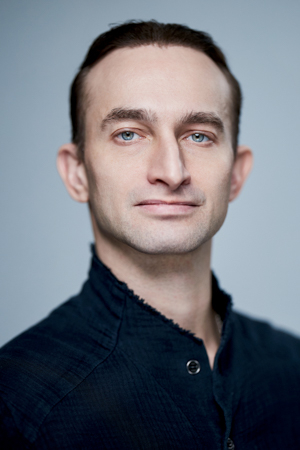
• Prize-winner at the Vaganova-Prix International Competition (St Petersburg, 2002).
Born in Chelyabinsk.
Graduated from the Vaganova Academy of Russian Ballet in 2002.
Joined the Mariinsky Ballet the same year.
Repertoire includes:
La Sylphide (James); choreography by August Bournonville, revised version by Elsa-Marianne von Rosen,
Giselle (Hans, Classical duet); choreography by Jean Coralli, Jules Perrot and Marius Petipa,
Le Corsaire (Lankedem); production by Pyotr Gusev after the composition and choreography by Marius Petipa,
La Bayadère (Magdaveya, Golden Idol, Hindu Dance); choreography by Marius Petipa, revised version by Vladimir Ponomarev and Vakhtang Chabukiani,
The Sleeping Beauty (Puss in Boots); choreography by Marius Petipa, revival of the 1890 production, staging by Sergei Vikharev,
The Sleeping Beauty (Blue Bird, Puss in Boots, Hunter); choreography by Marius Petipa, revised version by Konstantin Sergeyev,
Swan Lake (Jester); choreography by Marius Petipa and Lev Ivnov, revised version by Konstantin Sergeyev,
Raymonda (Saracen Dance, Grand pas); choreography by Marius Petipa, revised version by Konstantin Sergeyev,
Le Spectre de la rose; choreography by Michel Fokine,
Pétrouchka (Pétrouchka); choreography by Michel Fokine, production by Gary Chryst,
Le Sacre du printemps (Youths, Wise Men); choreography by Vaslav Nijinsky,
Les Noces; choreography by Bronislava Nijinska,
The Fountain of Bakhchisarai (Nurali, Youths, Tatar Dance); choreography by Rostislav Zakharov,
The Young Lady and the Hooligan (the Hooligan); choreography by Konstantin Boyarsky,
The Nutcracker (Moor, Chinese Dance); choreography by Vasily Vainonen,
Leonid Lavrovsky’s ballets Romeo and Juliet (Jester, Inn-Keeper) and Walpurgis Night (Pan),
Leonid Yakobson’s ballets The Bedbug (Father Renaissance), Spartacus (Retarius, Etruscan, Dying Slave) and Shurale (Shurale),
George Balanchine’s ballets Prodigal Son (Friends of the Prodigal), A Midsummer Night’s Dream (Puck) and Jewels (Rubies),
Études; choreography by Harald Lander,
Manon (Leader of the Beggars); choreography by Kenneth MacMillan,
Carmen (Bandit); choreography by Roland Petit,
Sylvia (Pluto); choreography by Frederick Ashton,
Yuri Grigorovich's ballets The Legend of Love (Dance of the Jesters), The Stone Flower (Danila’s Friends, a Hunchback),
Anyuta (Gossip); choreography by Vladimir Vasiliev,
The Nutcracker (Fritz, Chinese Dance, Recruit, Napoleon); production by Mihail Chemiakin, choreography by Kirill Simonov,
Cinderella (Hairdresser) and The Little Humpbacked Horse (The Tsar, Konyok-Gorbunok),
The Magic Nut (Cook, Royal Jester, Turkish Grooms); production by Mihail Chemiakin, choreography by Donvena Pandoursky,
Ondine (Tarantella); choreography by Pierre Lacotte,
“The Overcoat” after Gogol (Official with a War Missive); choreography by Noah D. Gelber, Aria Suspended; choreography by Peter Quanz,
The Ring; choreography by Alexei Miroshnichenko,
In the Jungle (the Woodpecker); choreography by Anton Pimonov,
Connections; choreography by Ilya Zhivoi,
The Bronze Horseman (Balakirev the Jester); choreography by Rostislav Zakharov, Yuri Smekalove,
Paquita (Old gypsy man, Guardian Officers); choreography by Yuri Smekalov, reconstruction and staging of Marius Petipa's choreography (Act III Grand Pas) by Yuri Burlaka,
Vladimir Varnava's ballets Yaroslavna. The Eclipse (Div, Konchak) and Pétrouchka (The Ringmaster),
Coppélia (Firefighters); choreography by Alexander Sergeev,
as well as dances in the operas Aida (Military Leader), A Life for the Tsar (Cracovienne), Lakmé and Prince Igor (Polovtsian Dances).